Annyeong Singapore – a flood of Korean restaurants opens here
Sign up now: Weekly recommendations for the best eats in town
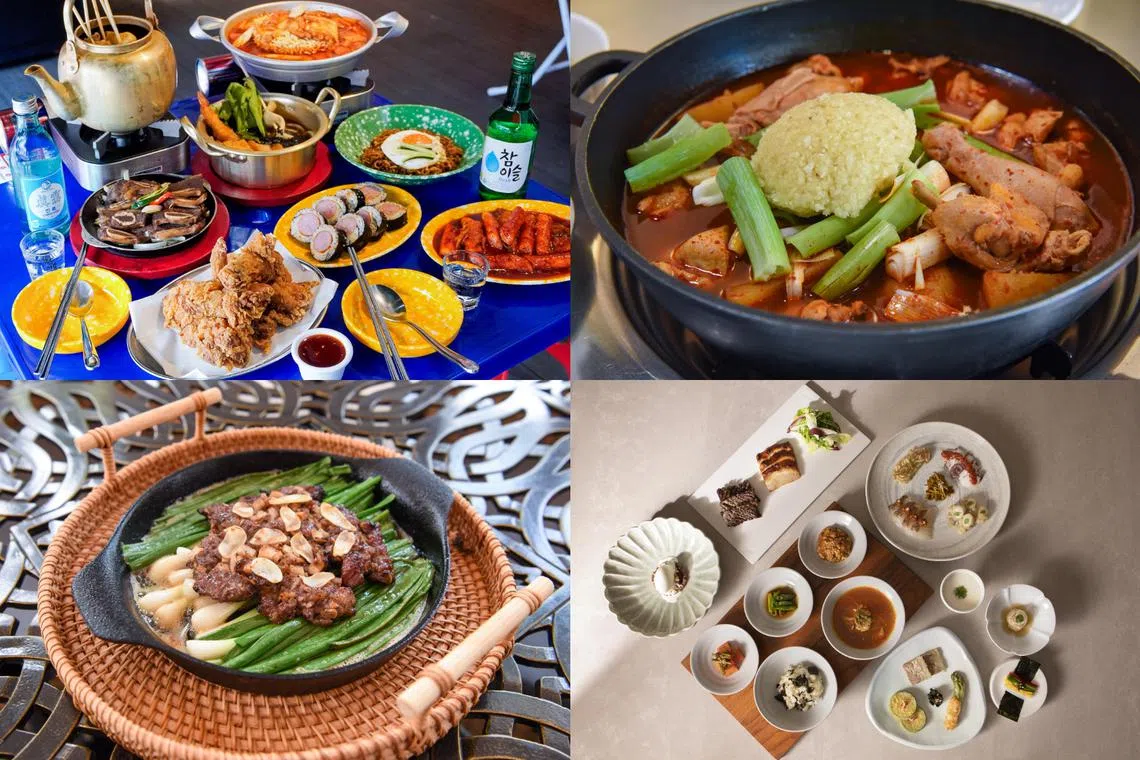
So far, at least 10 Korean restaurants have opened in 2023, with two or more to come before the year’s end.
PHOTOS: 88 POCHA, ONMI, EUGENE TAN
SINGAPORE – First came the mom-and-pop restaurants, then the Korean fried chicken joints,
So far, at least 10 have opened in 2023, with two or more to come before the year’s end.
Consider the Food Palace Group, with a portfolio that includes Taiwan’s Niu Dian Beef Noodles and bubble tea brand Palace Tea. In 2023 alone, it has opened four Korean restaurants under its new 88 Pocha brand: in Holland Village in March, in Kovan in June and in Duxton Hill in July. Its 85-seat 88 Seoul BBQ opened in Serangoon Garden on Friday. In September, it will open the 60-seat 88 K Town at Bugis Junction, offering casual food such as Korean fried chicken, stews and jjamppong, or spicy seafood noodles in soup.
Seonggong Holdings, which operates Seorae, a chain of Korean barbecue restaurants, opened the brand’s sixth outlet in June at Northpoint City. It also launched a new brand, Bulgogi Syo, opening the first outlet at Bugis Junction in April and the second at The Woodleigh Mall in May.
While Korean barbecue seems to be the restaurant concept du jour, some restaurateurs are trying to offer something different.
Ureshii at The Arts House offers Korean and Japanese dishes, with some crossovers. Onmi in Amoy Street serves course menus featuring traditional Korean flavours plated in a modern way. The signature dish at Kelim Dakdoritang in Serangoon Garden is a chicken stew usually eaten in Korean homes.
Even the Korean barbecue restaurants are upping their game. Bulgogi Syo serves its meat with a side of fire at the table. Omma’s new branch in Telok Ayer has a private seating area where diners can grill, sing karaoke and play darts. And 88 Seoul BBQ offers dry-aged pork. The brand’s 88 Pocha + BBQ in Duxton offers unusual cuts and parts such as chicken oysters, the two nuggets of meat from both sides of the bird’s backbone, and boneless chicken neck.
Why do Korean restaurants thrive in Singapore?
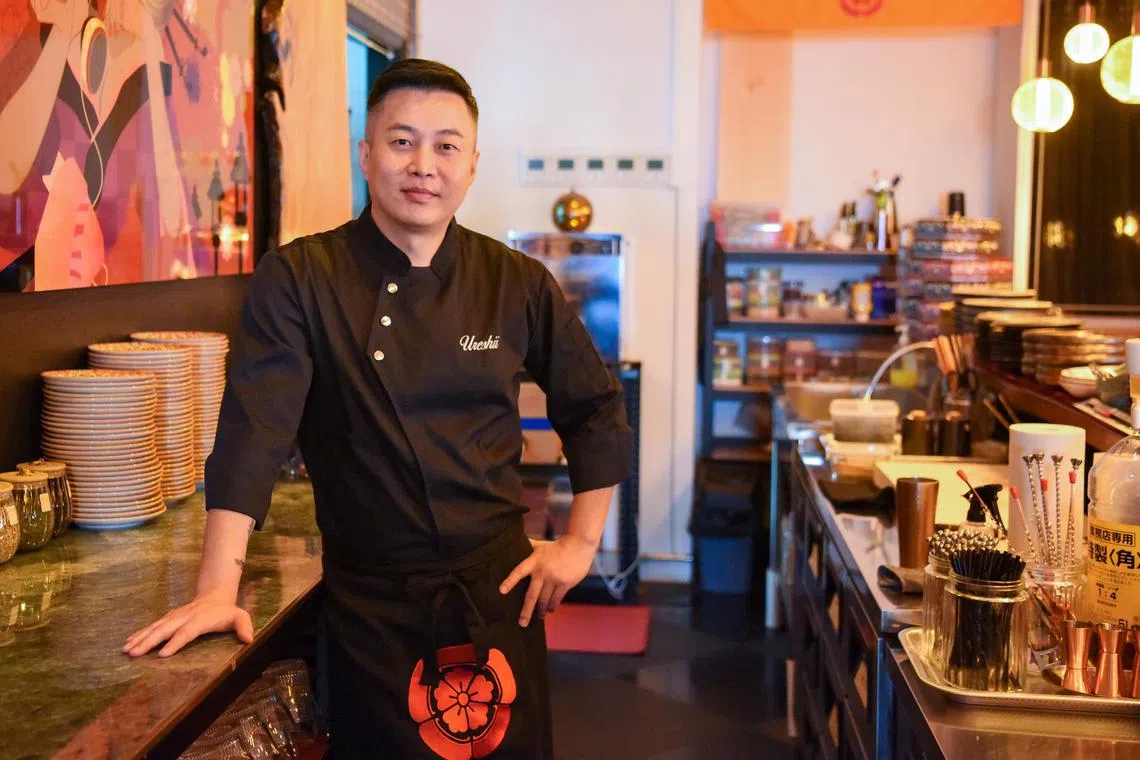
Restaurateur Jang Kyung-bok at Korean-Japanese fusion restaurant Ureshii.
ST PHOTO: EUGENE TAN
Chef Jang Kyung-bok, 43, of Ureshii says: “Singaporeans love Korean food, and they are interested in it because of K-pop and K-drama.”
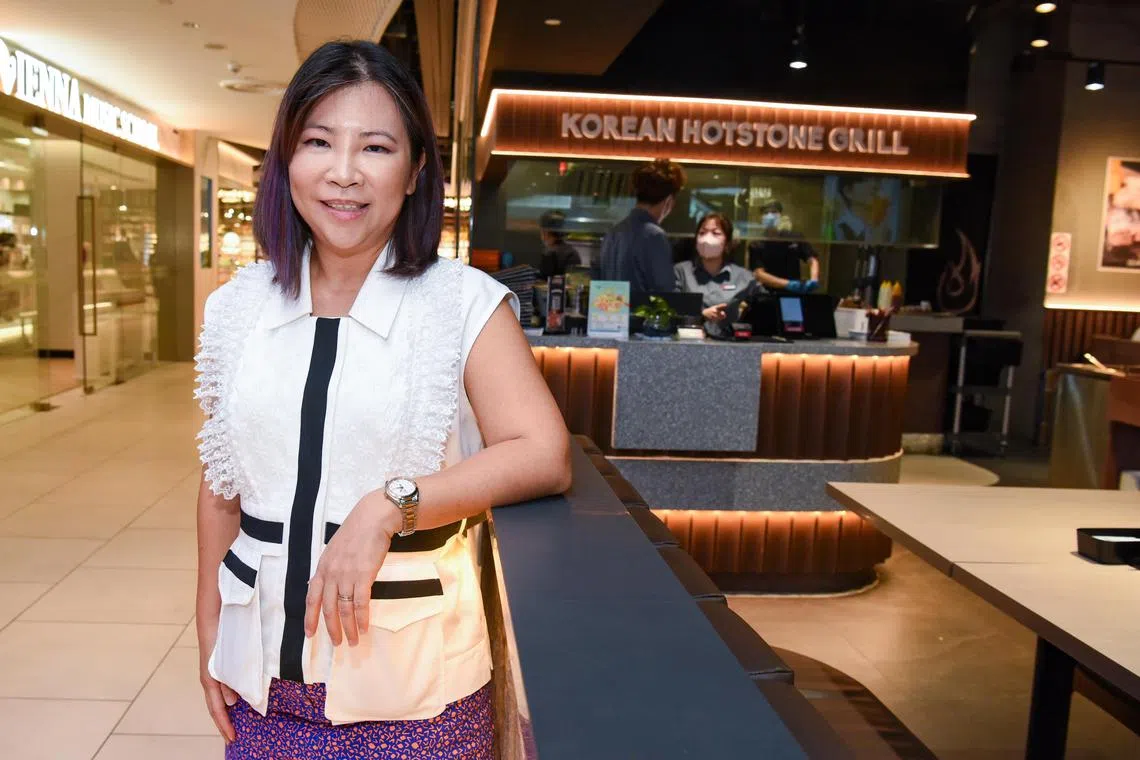
Ms Wilyawati Tjiu, managing director of Seonggong Holdings, which runs the Seorae, Bulgogi Syo and Pocha! brands in Singapore.
ST PHOTO: EUGENE TAN
Indeed, a love for K-culture drew Ms Wilyawati Tjiu, 45, managing director of Seonggong Holdings, to visit South Korea, and then to build a Korean restaurant business after leaving her corporate job as head of finance in a multi-national corporation.
“When I visit South Korea, I hunt down the best Korean barbecue restaurants,” she says, adding that her friends took her to Seorae in 2010. She later worked with its founder, chef Park Chul, to bring it to Singapore in 2015.
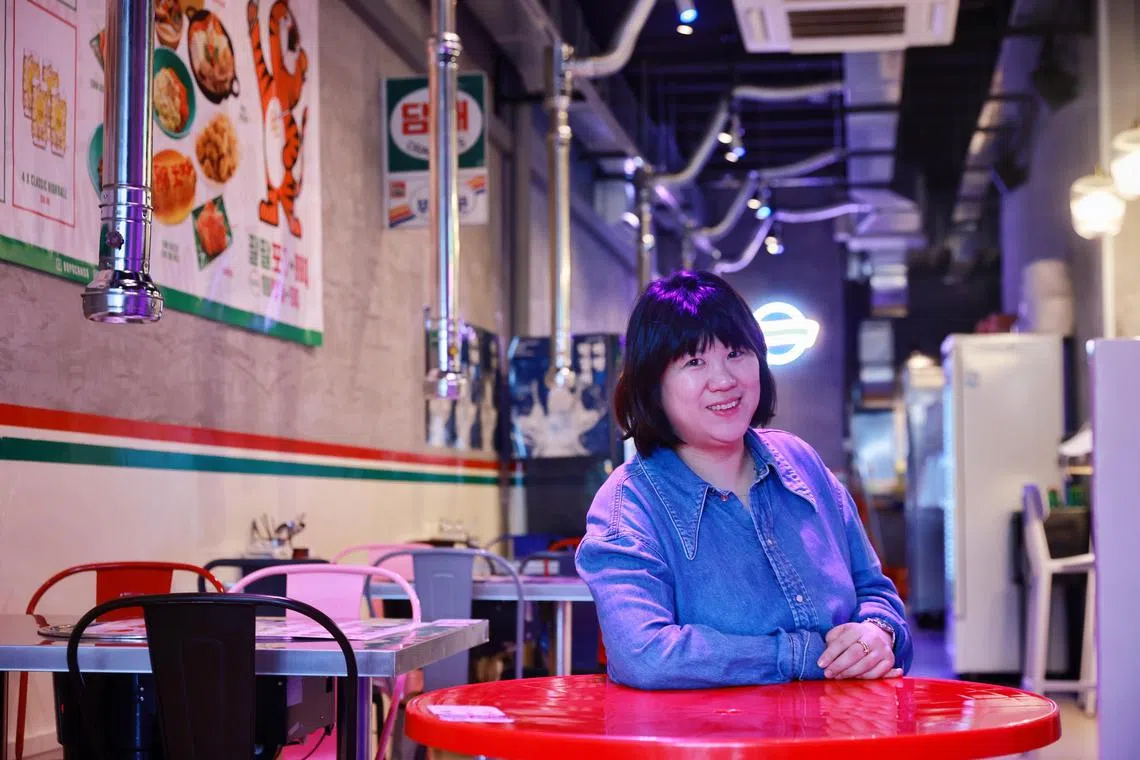
Ms Mago Lee worked with Food Palace Group to launch the retro Korean 88 Pocha brand.
ST PHOTO: JASON QUAH
Ms Mago Lee, 37, who worked with Food Palace Group to conceptualise and launch the 88 Pocha brand, adds: “K-dramas have helped to promote the food. And Singaporeans are always eating out, at breakfast, lunch and dinner.”
88 Pocha: Retro Korea
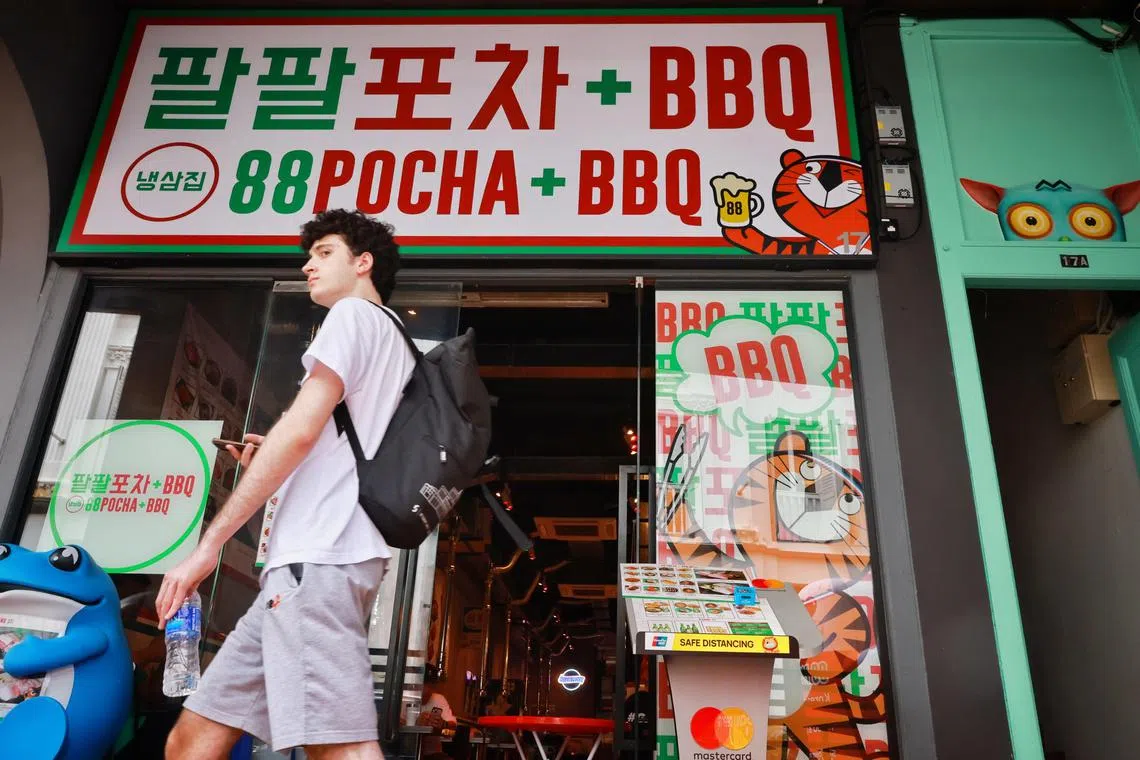
Exterior of 88 Pocha + BBQ at Duxton Road.
ST PHOTO: JASON QUAH
Where: Outlets in Holland Village, Kovan, Duxton and Serangoon Garden facebook.com/88pochasg
Info:
Before the pandemic, South Korean Mago Lee, 37, who runs a hair salon in Holland Village, would visit her home country every three months to suss out the latest trends.
The pandemic put a stop to that. But when she returned after the Covid-19 scourge ended, something was different.
“After Covid-19, there was a different vibe,” she says. “Young people there are into retro clothes, retro food, especially street food. I was very surprised. South Koreans love to go overseas for vacations, especially to the United States and Australia. But they couldn’t travel during the pandemic, so they turned to traditional Korean culture.”
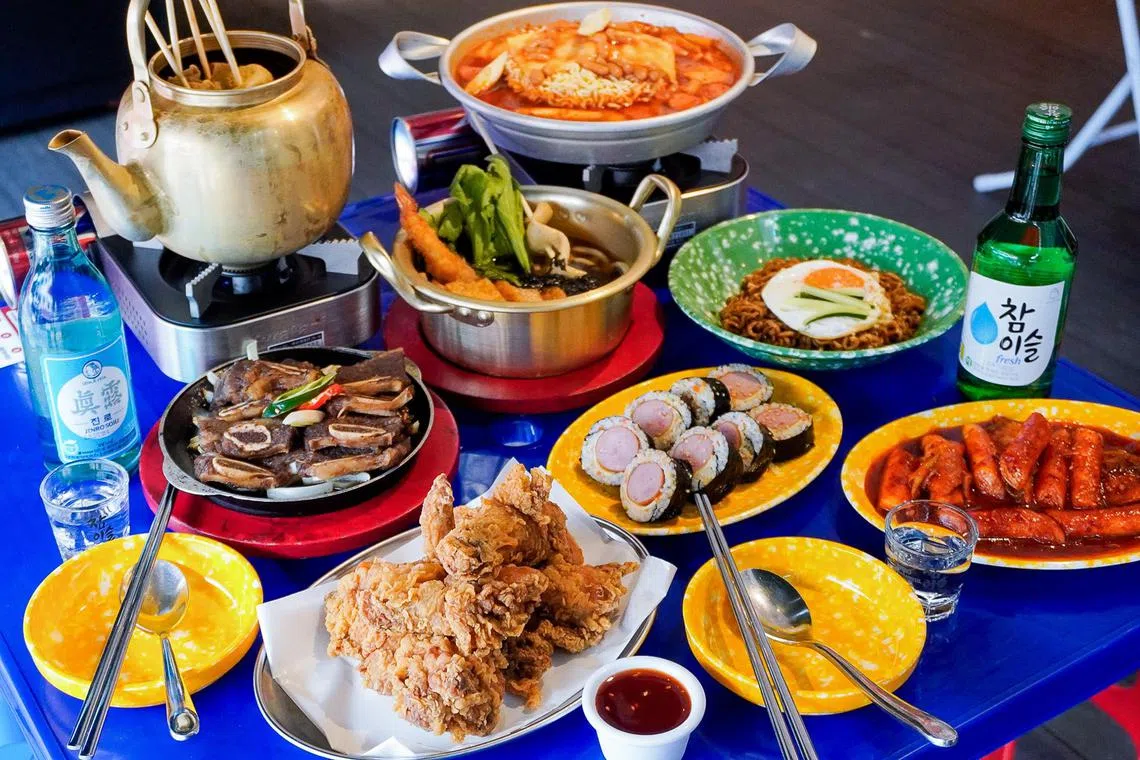
hykorean19 - Reporter to caption Copyright: 88 Pocha
PHOTO: 88 POCHA
She saw how street food had taken off in South Korea and wanted to bring the vibe of pojangmacha – or pocha for short – here. These are casual streetside eateries housed in tents. Back in Singapore, she worked with Food Palace Group to launch the 88 Pocha brand, and is an investor.
The 88 in the name is for 1988, a seminal year in South Korean history. It was the year Seoul got onto the world stage for hosting the Summer Olympics, and a time of political change and economic growth.
Indeed, Hodori, the tiger mascot of the 1988 Games, features prominently in the restaurants, which serve casual food such as Pork Kimchi Stew ($29.88), Truffle Jajjang Ramyeon ($12.88), fried chicken ($16.88), Sausage Gimbap ($12.88) and Tteokbokki ($12.88).
Ms Lee says: “I wanted the vibe to be easygoing. In South Korea, you would stop by a pocha on the way home from work, for dinner and soju.”
She has upped the ante with 88 Seoul BBQ in Serangoon Garden. Although there is beef on the menu, pork takes centre stage at the restaurant. Duroc pork, from the American breed, is dry-aged in the restaurant for 21 days. The process is meant to tenderise the meat and intensify its flavour. Aside from belly and collar, the restaurant also serves pork rib fingers, taken from the strips between the spare ribs.
Kelim Dakdoritang: Heritage brand
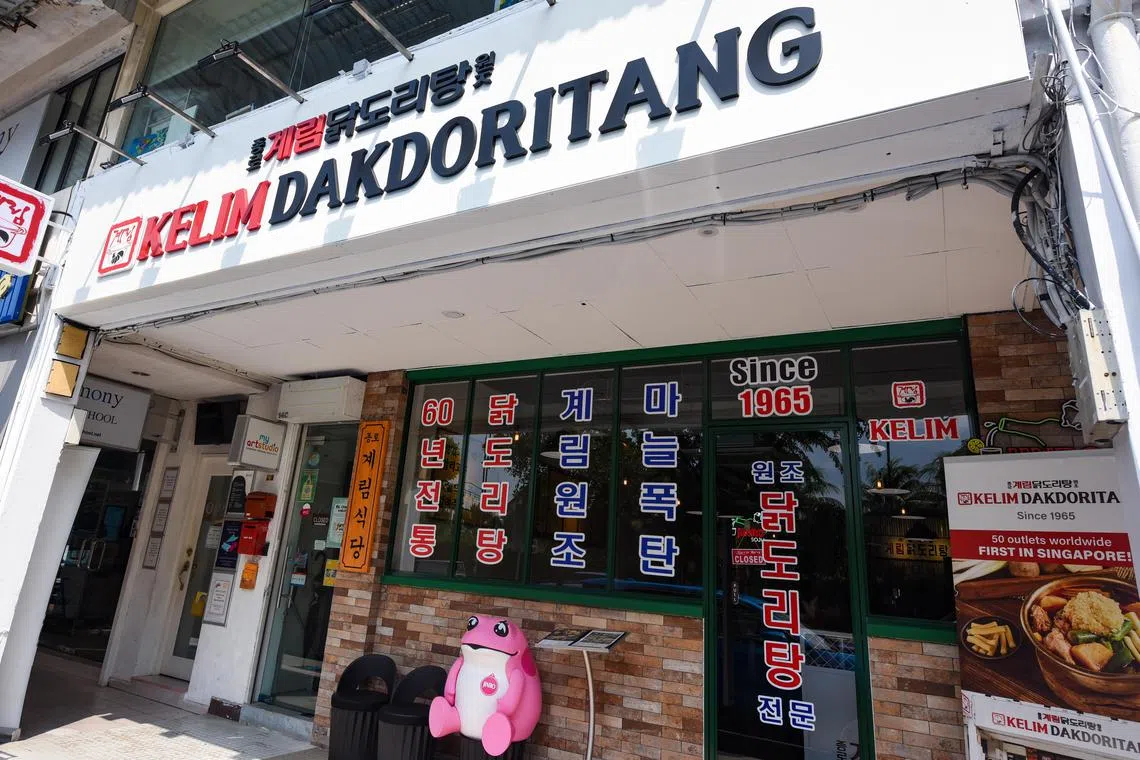
Kelim Dakdoritang located at Kensington Park Road.
PHOTO: EUGENE TAN
Where: 14B Kensington Park Road kelimdakdoritang.com.sg
Tel: 6241-4241
Open: 11.30am to 2.30pm, 5.30 to 10pm daily
Info:
Korean chicken stew chain Kelim Dakdoritang has a history that goes back to 1965.
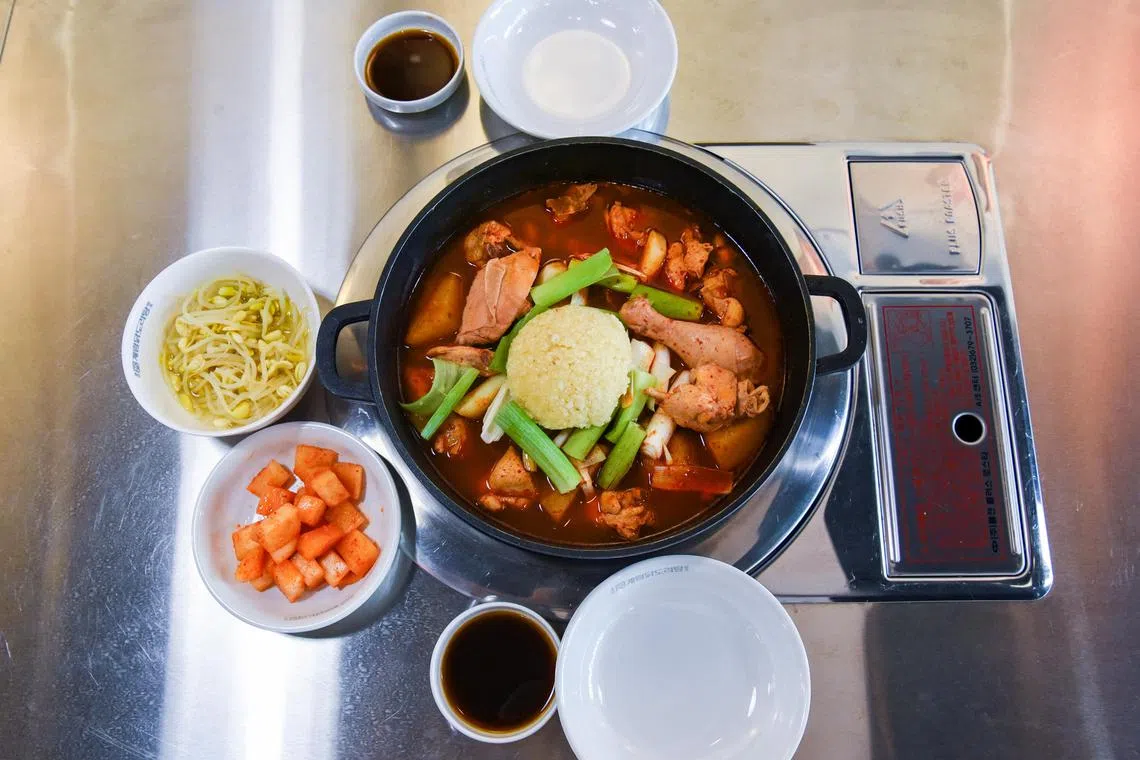
Kelim Dakdoritang’s signature dish, Spicy Chicken Hotpot, which is topped with a mountain of minced garlic.
ST PHOTO: EUGENE TAN
That was when Mr Lee Rae-yung, now 77, and his uncle opened a restaurant in Jong-ro, Seoul, serving dakdoritang. Their version of the stew is made with a lot of chopped garlic, the way Mr Lee’s mother cooked it for the family.
It was also the year Singapore became independent, and the Serangoon Garden restaurant’s Aug 1 opening, close to National Day, is no coincidence.
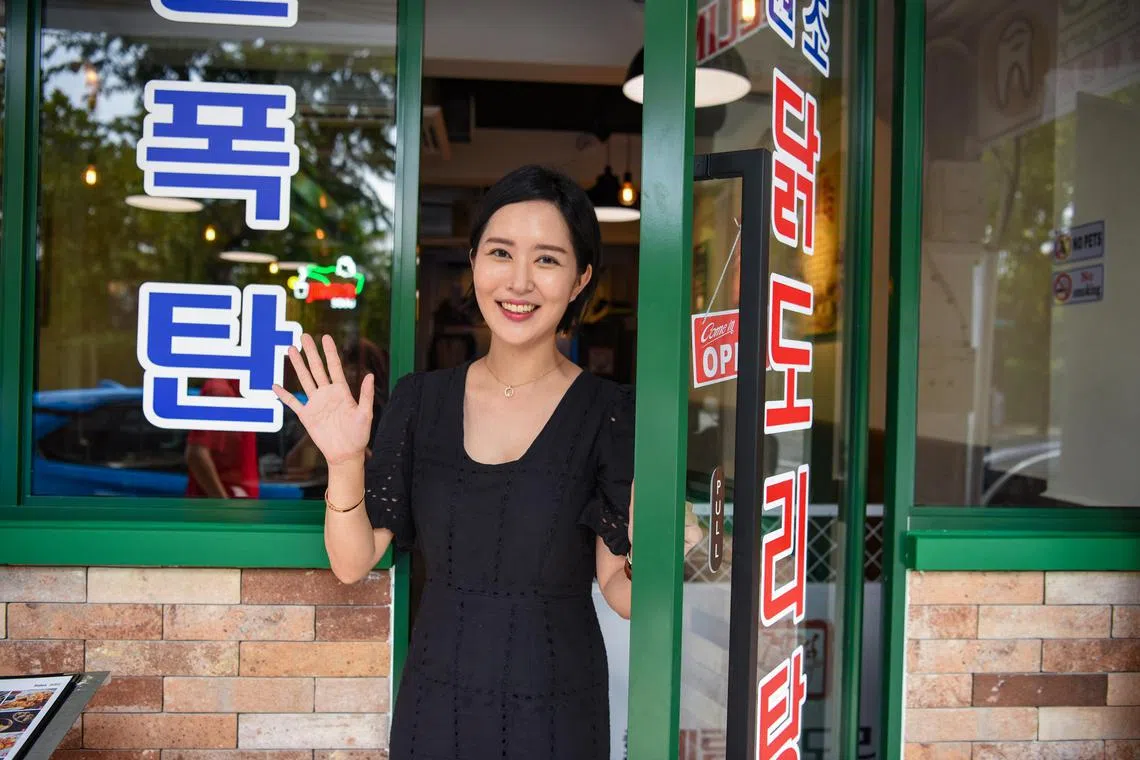
Ms Anna Lee brought Kelim Dakdoritang, which serves Korean chicken stew, to Singapore with her partner.
ST PHOTO: EUGENE TAN
Ms Anna Lee, 31, a South Korean who has lived here for about seven years and has a casual Korean eatery called Han Kki in Toa Payoh; and her partner, Mr S.S. Wong, 38, decided to bring Kelim’s dakdoritang to Singapore. He tried the stew for the first time when the couple visited South Korea in 2019, and thought it was very good.
Ms Lee and Kelim’s chief executive, Mr Lee Seong-min, are childhood friends, and planning began soon after. The pandemic got in the way of opening sooner. Now, however, the restaurant is up and running, with a decor similar to Kelim’s 50 outlets in South Korea, right down to the zinc wall panelling, tabletop stoves and chairs with an under-seat compartment for stowing away bags.
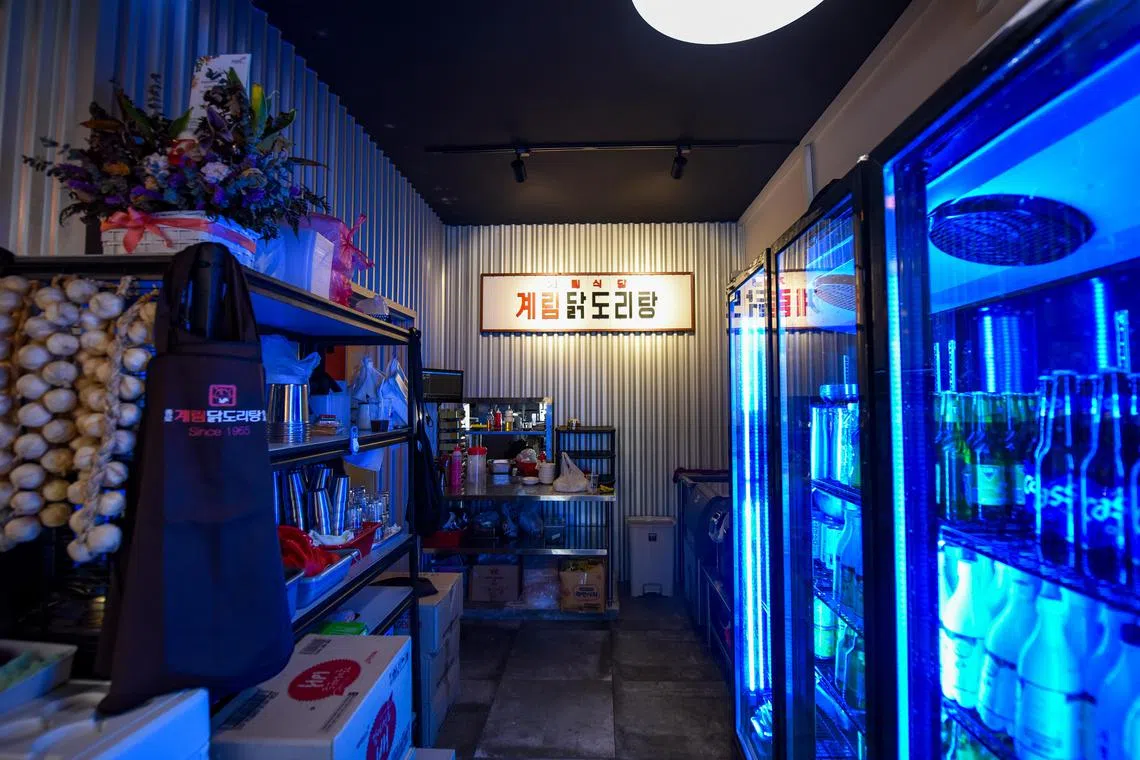
Kelim Dakdoritang in Serangoon Garden is designed to look like the brand’s restaurants in Korea, right down to the zinc wall panels.
ST PHOTO: EUGENE TAN
The stew, with prices starting at $36.90 for a small serving, comes in spicy and clear versions, and is served with a “garlic bomb”, a large mound of finely chopped garlic, the Kelim way. Add-ons include kalguksu noodles ($5) and tteokbokki ($4), both brought in from South Korea.
But the 55-seat Singapore restaurant has some significant differences. Given that diners here like variety, the couple came up with side dishes that are not available in the South Korean restaurants. These include Cheese Gyeranjjim or steamed egg ($12.90), Cream Tteokbokki ($12.90) and Odengtang or fish cake soup ($18.90).
Despite the fact that there are at least four Korean restaurants in the area, Ms Lee says of the location: “I live nearby and love the vibe of this neighbourhood.”
Mr Wong adds: “Our food offering is different. We don’t do Korean barbecue. We think any place is good for a first shop because we are offering something that many Singaporeans have not had before.”
Once business and operations settle down, the couple will be looking for heartland locations to open more outlets in.
Kelim’s CEO Mr Lee, 42, says: “Unlike bibimbap, bulgogi and fried chicken, which are commonly associated with Korean cuisine, dakdoritang is a well-known dish for Koreans, but not as recognised by foreigners.”
He believes his dakdoritang, which he calls Korean soul food, has legs in Singapore, particularly after getting feedback from diners when he was here for the opening.
“My confidence stems from the enduring popularity of Kelim’s flavour, which has thrived for 58 years in South Korea.”
Ureshii: Korean-Japanese fusion
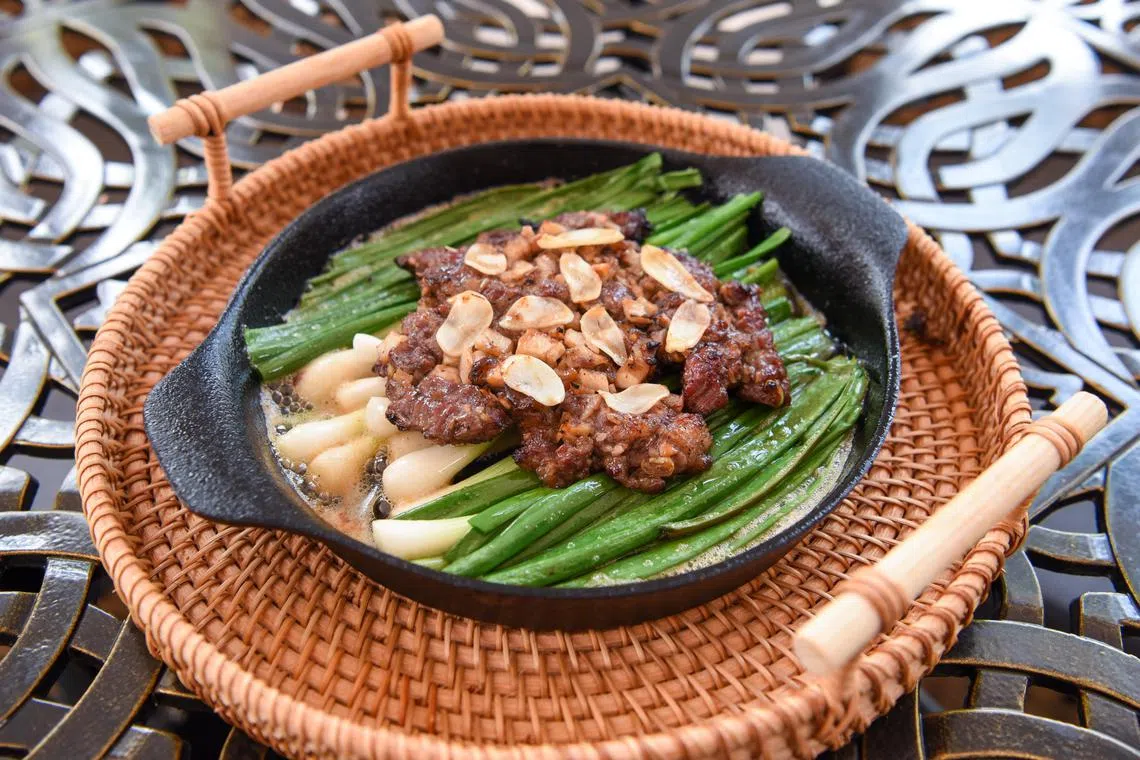
Ureshii Tteok-Galbi, grilled minced beef rib.
ST PHOTO: EUGENE TAN
Where: 01-02 The Arts House, 1 Old Parliament Lane
Tel: 6322-4054
Open: Tuesdays to Sundays, 11.50am to 2.30pm, 6 to 10.30pm; closed on Mondays
A love for Japanese food, and cooking, led restaurateur Jang Kyung-bok, who used to run fitness centres in South Korea and Singapore, to switch gears.
The 43-year-old opened Tanoshii in Cairnhill Road in 2018, after spending two years in Osaka learning to cook Japanese food from a mentor chef there. The menu at the restaurant, he says, is 70 per cent Japanese and 30 per cent Korean.
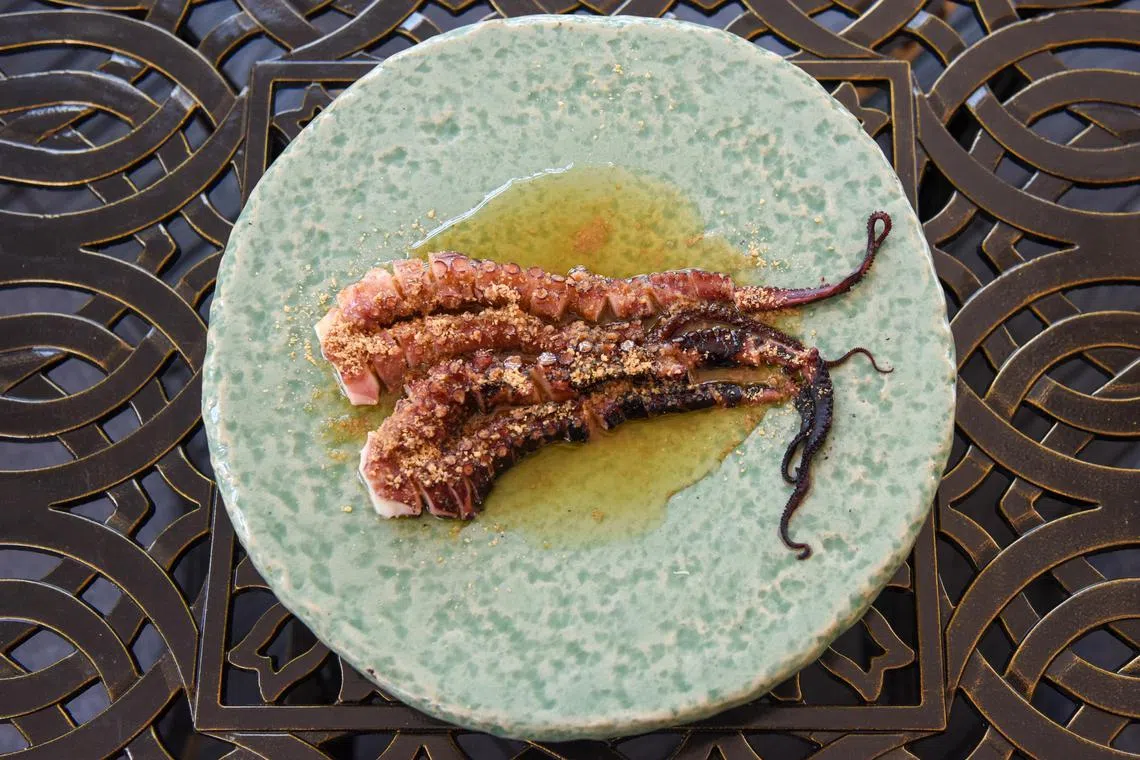
Ureshii's steamed Hokkaido octopus drizzled with artisanal Korean sesame oil.
ST PHOTO: EUGENE TAN
In July, he opened the plush 88-seat Ureshii at The Arts House, spending $2 million on the fit out. The menu ratio is flipped at the new restaurant – it is 70 per cent Korean and 30 per cent Japanese. Some of its signature offerings include Gujeolpan ($38) from Joseon court cuisine, in which diners wrap sliced vegetables and meat in pancakes and dip them in a pineapple and pine nut sauce. There is also Sesame Oil Octopus ($58), featuring steamed Hokkaido octopus drizzled with artisanal Korean sesame oil; Deulgireum Maemil Gooksu ($18), buckwheat noodles tossed with artisanal Korean perilla oil; and Ureshii Tteok-Galbi ($38), minced beef rib marinated in artisanal soya sauce and grilled.
Chef Jang, who has lived here for 15 years, says he tries as much as possible to source for ingredients from South Korea, and some dishes in the restaurant are made using his grandmother’s recipes. The Korean vibe extends to the striking red boxes at the tables, inlaid with pearl. Diners will find cutlery, serving spoons and napkins in them.
Ureshii has been open for barely a month, but Jang is already planning his third restaurant. This time, it will be all Korean.
“Next year, I want to open a restaurant serving very traditional Korean food, homestyle dishes but served in a modern way,” he says. “I want to show how Korean food can be plated beautifully.”
He also wants to show diners here what real jjigae or stew should taste like.
“I find that in Singapore, not many restaurants put effort into jjigae,” he says. “It has to have a very good broth. I want to serve authentic jjigae, cooked from the heart.”
Bulgogi Syo: Fire show
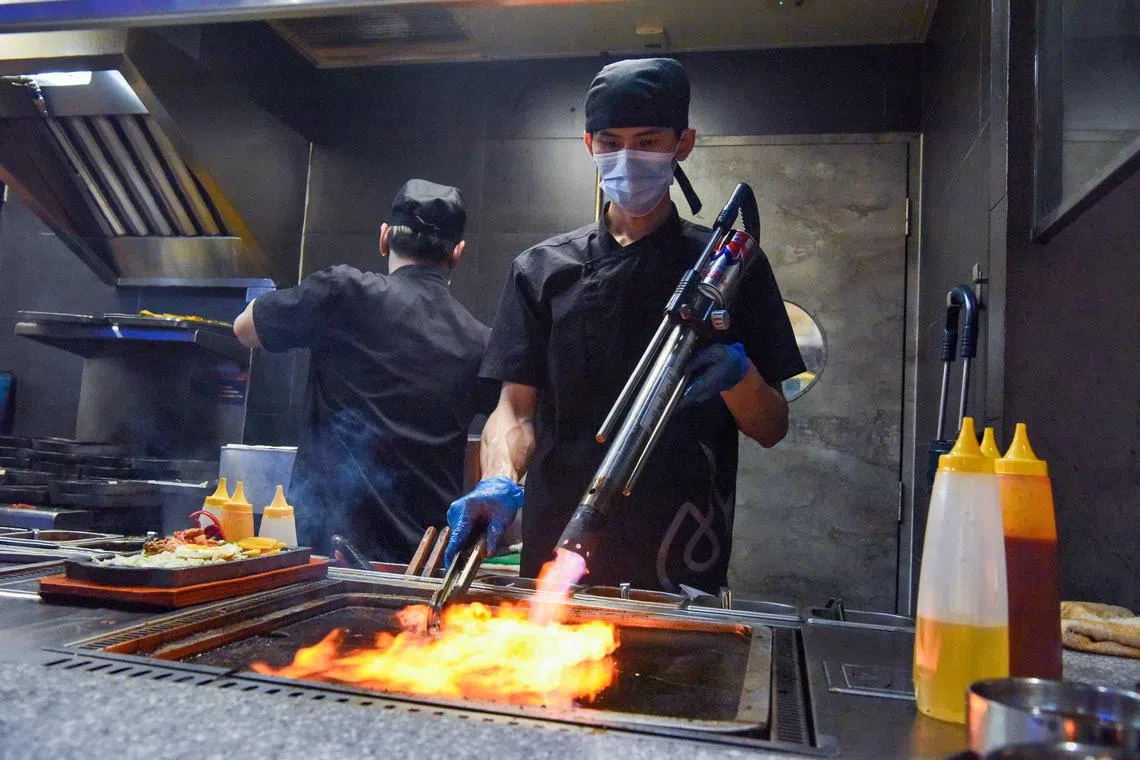
At Bulgogi Syo, beef and pork are blowtorched in the kitchen as part of its three-step grilling process.
ST PHOTO: EUGENE TAN
Where: Outlets at Bugis Junction and The Woodleigh Mall bulgogisyo.com
Info:
On the wall-mounted screens at Bulgogi Syo, dancing flames play on a loop, giving diners an idea of what happens to the meat they order. Another clue: flames erupting at the tables.
Pork and beef go through a three-step cooking process. In the kitchen, it is first seared on Korean hotstone pans, then flamed with large wall-mounted blowtorches at more than 1,000 deg C. The platters are then brought to the table, where the meat is flambeed with the restaurant’s “Special Essence”, an alcohol-laced concoction.
Fiery drama like this is made for the age of TikTok and Instagram reels, and the two restaurants, at Bugis Junction and The Woodleigh Mall, are packed even on slow dining days like Mondays.
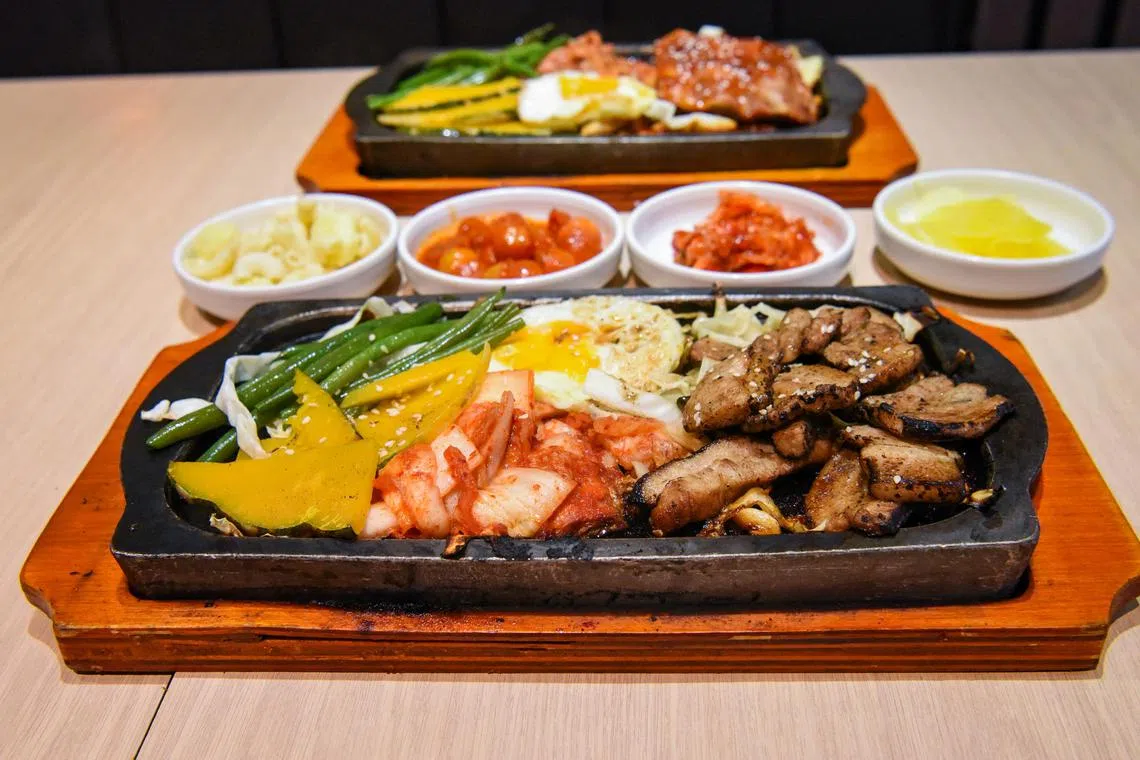
Bulgogi Syo’s Samgyeobsal (Duroc Pork Belly).
ST PHOTO: EUGENE TAN
At lunch, hotstone meals are priced from $14.90 for Dakgalbi or chicken. To get a tableside fire show, order Samgyeobsal ($19.90), featuring Duroc pork belly. Set meals come with hot seaweed soup, soft drinks and free-flow banchan.
A la carte signatures include gochujang-glazed Pork Baby Back Ribs ($26.90 for 350g) and Angus Beef Tenderloin ($35.50 for 150g).
The new brand comes from restaurateur Wilyawati Tjiu, 45, and South Korean chef Park Chul, 55, who started the Seorae chain of Korean barbecue restaurants in 2007. Ms Tjiu, an Indonesia-born Singapore citizen, brought Seorae to Singapore in 2015, and it has grown to six outlets here. She also runs Pocha! – a chain of Korean street food restaurants with outlets at Northpoint City, Plaza Singapura and Jem.
Bulgogi Syo came about because she wanted to do a different kind of Korean barbecue.
She says: “There’s a gap in the Korean dining experience, and that is the combination of authentic flavours and new dining excitement. Hot pans offer a delightful sizzle, but what’s missing is the smokiness of Korean barbecue.”
The fire show at Bulgogi Syo plugs that gap. Although chef Park has always practised the three-step grilling process, she modified it for the new brand, knowing from experience that blow-torching meat at the table will not fly with diners here.
“Flaming the meat table-side is dangerous,” she says, explaining why the blow-torching is done in the kitchen. “We want to do it in a safe way.”
She hopes to open 10 more Bulgogi Syo restaurants in Singapore, and favours malls for practical reasons.
“I’m a mother of three, and if I am going to take my family out for Korean barbecue, I want it to be in a convenient location,” she says.
Onmi: Traditional taste, modern touch
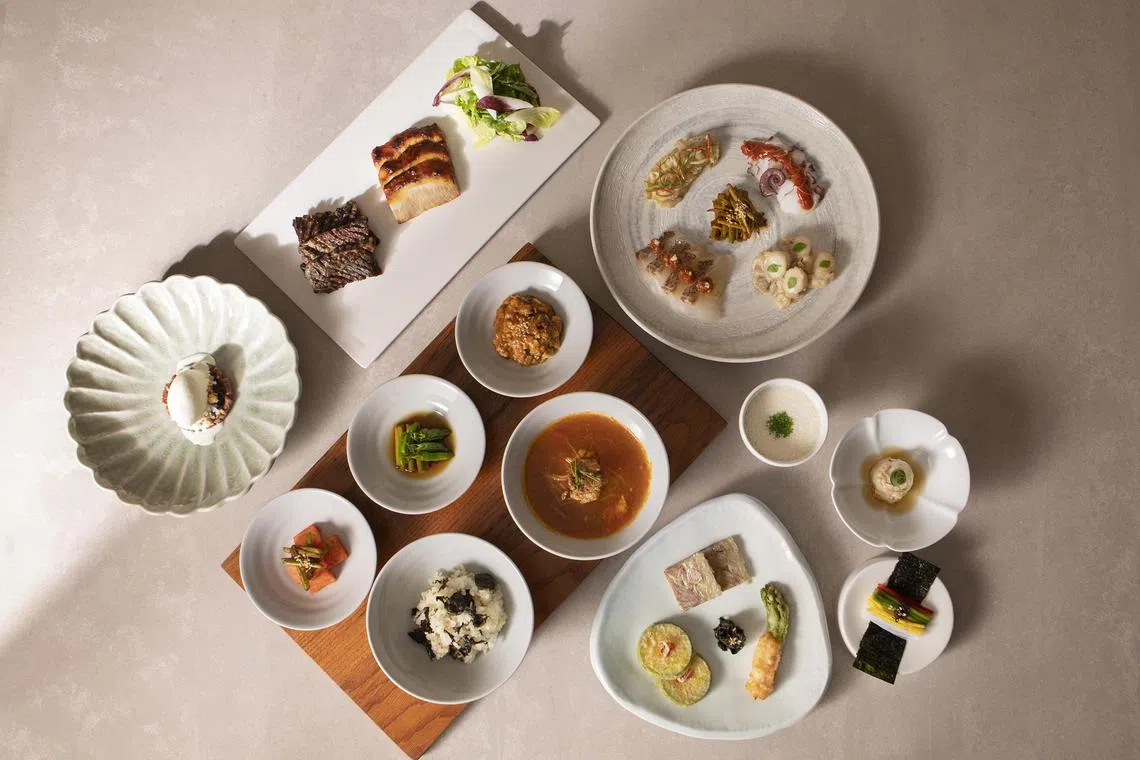
Onmi’s course menu.
PHOTO: ONMI
Where: 107 Amoy Street onmi-sg.com
Tel: 6612-5531
Open: Tuesdays to Saturdays, 6 to 10.30pm; closed on Sundays and Mondays
Info:
Amoy Street is dotted with Korean barbecue places, but near the end of it is Onmi, a different kind of Korean restaurant.
The 40-seater, which opened in March, bridges the gap between casual and fine-dining Korean. That said, Onmi, a Korean word which translates to “warm dining experience”, skews more in the direction of Michelin-starred Meta in Mohamed Sultan Road and Nae:um in Telok Ayer Street than jjigae joints.
For now, it is open only for dinner, and multi-course meals are priced at $135 a person.
Ms Ren Leong, 32, one of three co-owners, says: “If you compare the Japanese and Korean dining scenes in Singapore, the Japanese one is more mature, and there is more variety. With the Korean scene, you have barbecue restaurants and stew houses, and fine-dining restaurants. There is not much in between.
“We want diners to experience authentic Korean food and flavours. We don’t do caviar and truffles.”
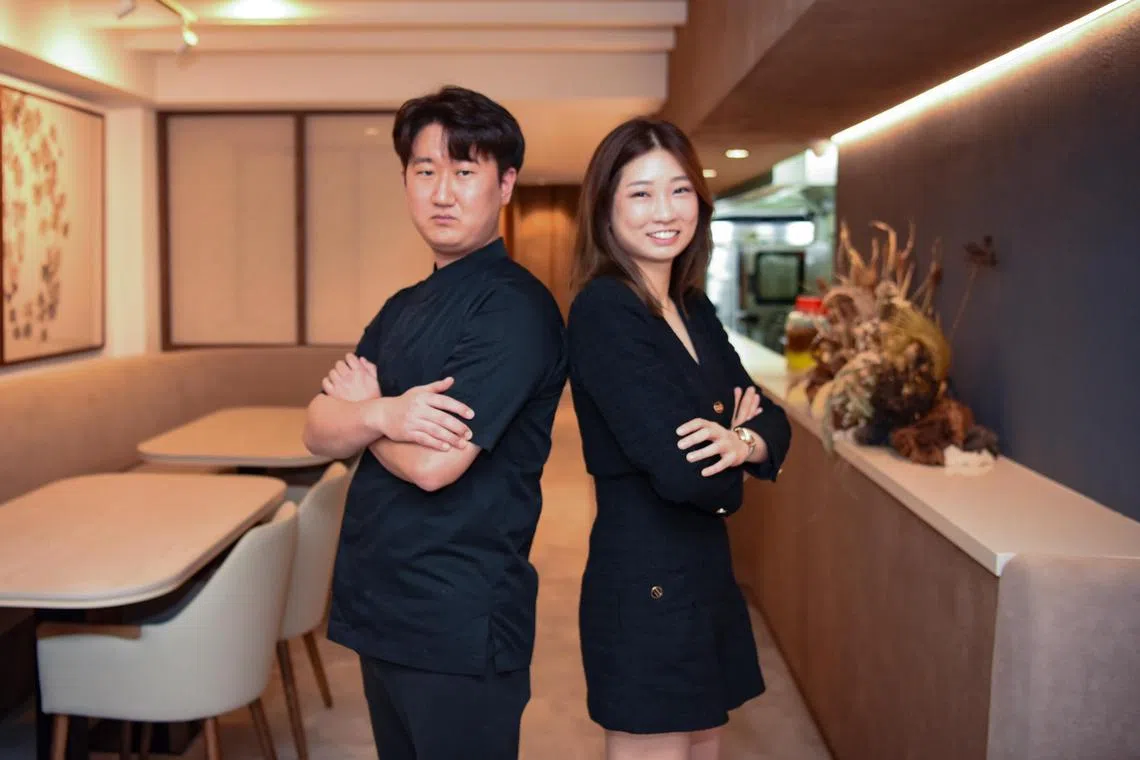
(From left) Omni head chef Park Young-cheol and co-owner Ren Leong at the restaurant, which bridges casual and fine-dining Korean.
ST PHOTO: EUGENE TAN
Her mother is Korean, and she grew up eating Korean food at home. She and the other partners hired chef Park Young-cheol, 30, who has worked at two-Michelin-starred Thevar in Keong Saik Road, Corner House at the Botanic Gardens and Osia in Sentosa.
She says: “We wanted a Korean chef to head the kitchen. He knows traditional Korean food, and from his experience at Michelin-starred restaurants, can serve it with fine-dining finesse.”
One of the snacks on the current menu is tangpyeongchae or mung bean jelly salad. The chef’s version features thin strips of the jelly that the diner rolls up in a sheet of seaweed together with watercress, egg, black fungus and red capsicum. Among the seafood dishes are slices of raw red snapper rolled up with strips of green capsicum and cucumber and topped with makjang, or fermented soya bean paste. The main course includes galbi-sal, beef marinated with vegetable-infused ganjang or Korean soya sauce, then grilled; and gomtang, beef bone soup simmered for 30 hours.
The next step for the restaurant is to hire enough kitchen staff so it can start serving lunch. Corporate types and people working in office buildings nearby throng the area at lunchtime.
“The lunch crowd here is something we should not miss,” Ms Leong says.
Omma Korean Charcoal BBQ: Games and karaoke with barbecue
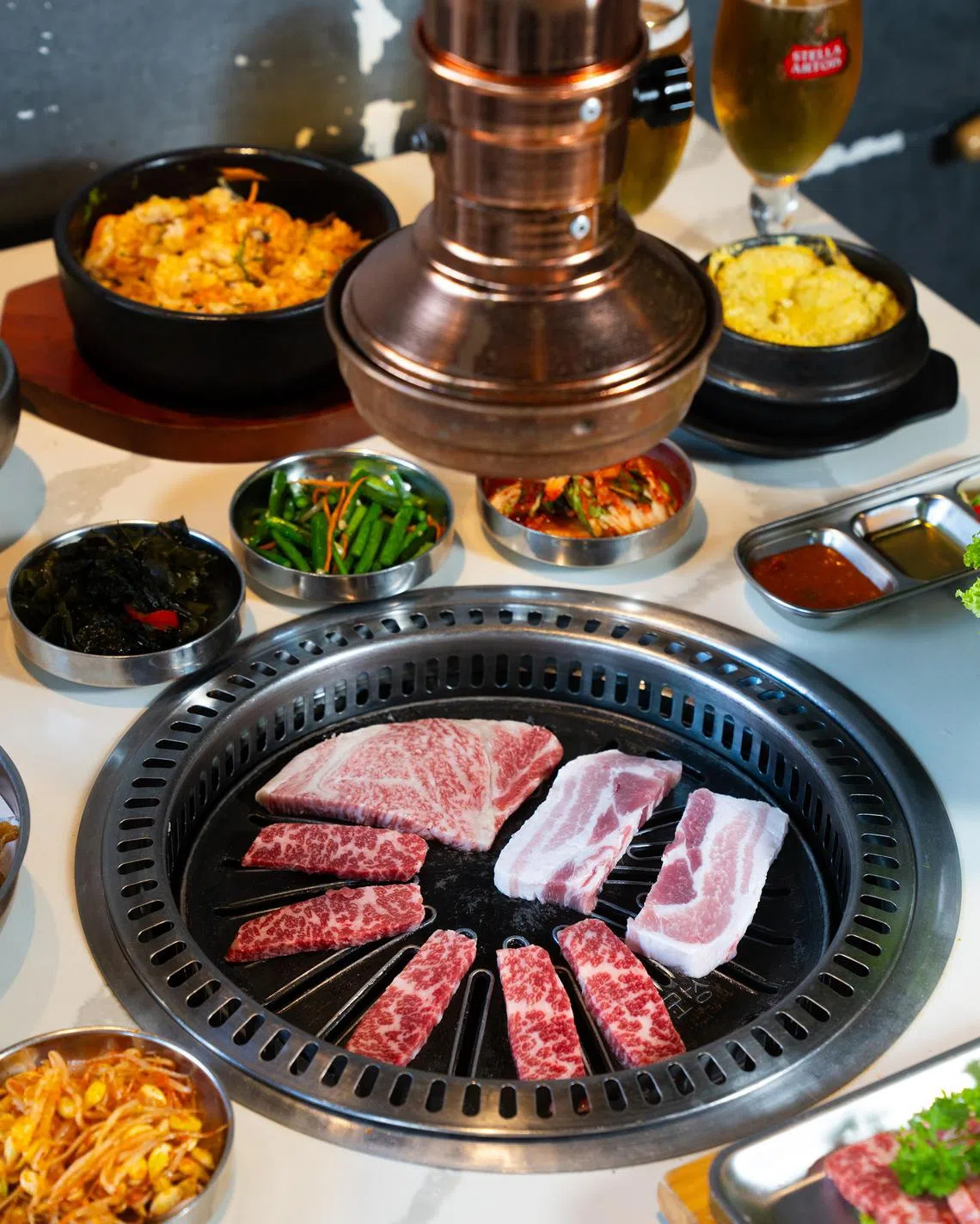
Omma Korean Charcoal BBQ’s premium meat selection.
PHOTO: OMMA KOREAN CHARCOAL BBQ
Where: 126 Telok Ayer Street omma.com.sg
Tel: 8861-0376
Open: 11am to 11pm daily
Info:
At the newly opened Omma Korean Charcoal BBQ in Telok Ayer, diners can book the private dining area which seats 30. There, they can barbecue, sing karaoke and play games, such as darts, to their hearts’ content.
The restaurant, spread out over three floors, seats 128 indoors and 24 outdoors.
It is the third restaurant in the chain, which also has outlets in Bukit Timah and Holland Village. The owners are Mr Jason Lim, 58 and Ms Priscilia Koh, 55, who also own Old Street Bak Kut Teh, with restaurants in Singapore, Thailand, Indonesia and Myanmar.
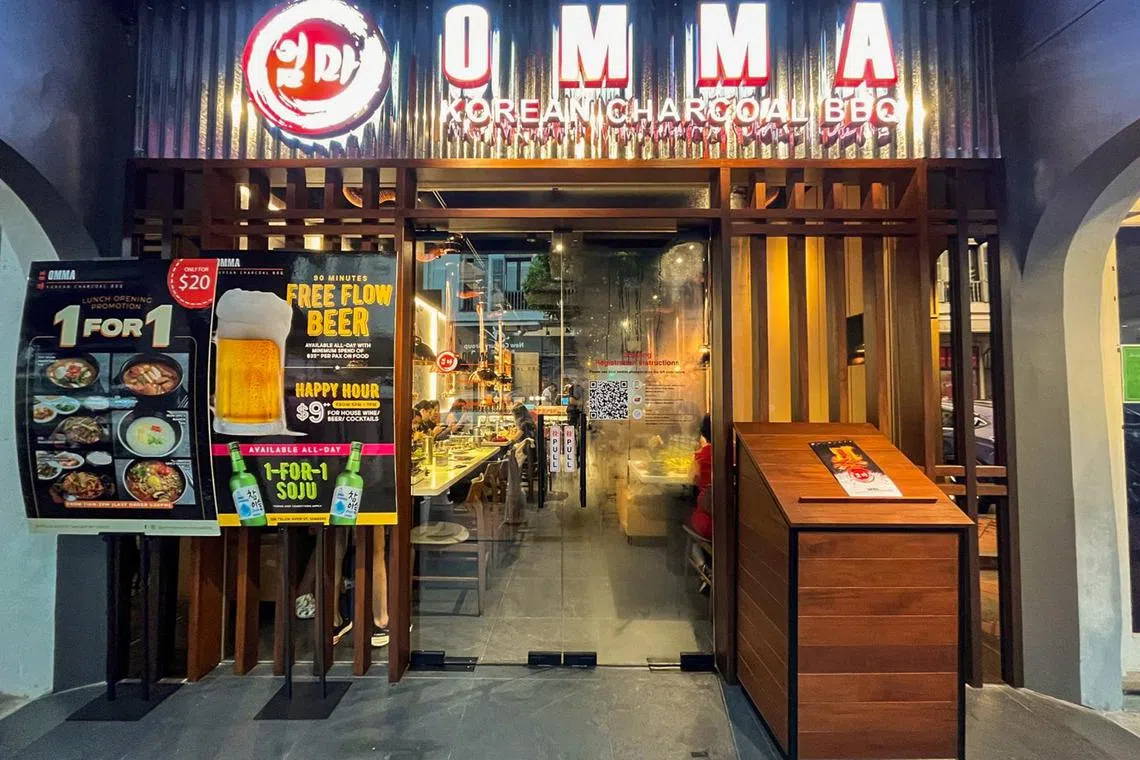
Omma Korean Charcoal BBQ’s latest outlet at Telok Ayer Street.
PHOTO: OMMA KOREAN CHARCOAL BBQ
In September, they plan to open a restaurant serving Korean-Western food in Jewel Changi.
Mr Lim says the Omma restaurants were the first in Singapore to offer wood-fired Korean barbecue. Meat is grilled over smokeless charcoal, and diners can add wood chips – cherry, apple, hickory, mesquite and pecan – priced at $3 for 30g, to flavour their meat even more.
He adds: “Our Korean BBQ restaurants are family- and pet-friendly places, something that is hard to find among Korean restaurants.”
The Bukit Timah and Holland Village restaurants, he adds, were chosen because they are close to residential areas, so families will not have to travel far to get to them. The new restaurant in the Central Business District, he says, “would make our brand more accessible to the office crowd as we are able to provide a good ambience for business lunches and dinner”.
The signature meat at the Omma chain is Japanese A4 ribeye, priced at $81 for a 180g serving, and A4 striploin, at $76 for 180g. Diners can also order Iberico Pork Jowl at $28 for 180g and Beef Tongue at $39 for 180g.
There is a lunch promotion to mark the opening at Telok Ayer. The restaurant is offering a $20 one-for-one deal, where pairs of diners can choose from kimchi or soya bean paste soups; beef, pork or chicken bulgogi; spicy or non-spicy ramen from 11am to 2pm every day.



